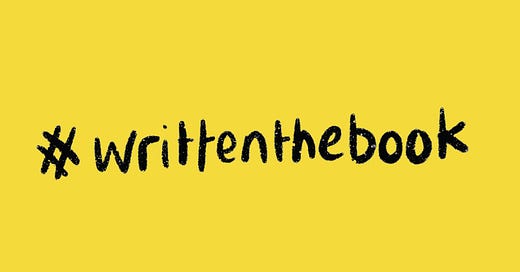How we got to Written
After a decade of helping other people to write, we've written a book distilling what we've learned. This is who we are and how we got there.
Hello, Chris here. If you’ve followed our work for any amount of time, you might have figured out that we are married. If you haven’t, well, now you know. It’s not something we normally write about because our work is about you. But for this one time, I’m going to make an exception because we have an important announcement to make (and no, we’re not getting a divorce).
Writing has been an important part of both our lives for decades. You might even say it defines who we are.
Our story
We met 20 or so years ago in a bookshop. We were working as booksellers in a very unglamorous shopping precinct in the north of England (Dillons in Stockport). Bec went on to work as a journal editor, then joined a book publishers, then worked in communications.
We moved to London, then left it so she could manage a rural writing centre for writing charity Arvon where she’d rub shoulders with big name authors and writers. She wrote creative fiction in her spare time. Then wrote a non-fiction book which I think is rather good, but now, she’s mortified by.
Over the same time, I’ve been a copywriter, ad-writer and ghost writer. It’s been, well… varied. I’ve written short stories, blogs, press releases, articles, websites, leaflets for bin collections, tee shirt slogans, technical manuals for home office printers and road signs for councils.
I turned my hand to scriptwriting too – sit coms if you were wondering. Wrote hundreds of treatments and episodes and at one point, wrote and made a short film. Needless to say, Bec thinks this is rather good, but I don’t.
A puzzle that stuck
We started The Written Academy (or Prolifiko as it was then) about a decade ago because we were both fascinated by writing process and particularly, why some people kept going with their writing projects while others stopped.
Did some people have something that other people didn’t? We went on to conduct research among thousands of people over the years to find this out. We even made an ill-fated app that almost bankrupted us at one point we were so obsessed by the question.
What we found surprised us – it might surprise you too.
We discovered that the people who were able to persist and get their projects written didn’t have a special talent. They weren’t more gifted, didn’t necessarily have more time, more motivation, more dedication or more writing mojo. But they did have one thing in common.
Productivity is personal
They all did certain things to keep themselves going when they felt like they wanted to stop – and those things were always personal to them. They also approached writing with an open mind. And by this I mean, they were willing to experiment and they didn’t remain wedded to approaches that didn’t work.
Early on, as ‘experts’ we tried to teach people some of these tactics themselves – but that didn’t work. Why? Because people had to discover these things for themselves. So, over five more years we experimented with how we could do this. We coached individuals and groups of people, delivered seminars, webinars and presentations.
We wrote; we read hundreds of research papers and bored friends and family to death. We kept going until we found a model that actually worked. And now, the time has come to share that model with you.
Getting to Written
We’re absolutely thrilled to announce that our new book, Written: How to keep writing and build a habit that lasts is now published by Icon Books. It’s taken over two years to write and it’s the culmination of a decade of work and thousands of hours spent coaching (and cajoling) people to write.
With a forward written by one of our own personal writing heroes Oliver Burkeman (who says it contains some of the best productivity advice he’s ever read for writers *blushes*), it boils down everything we’ve learned about how to develop a writing habit that actually sticks. It contains inspiring stories, the latest research and practical tips based in our coaching experience.
We sincerely hope it helps *you* to keep writing.







